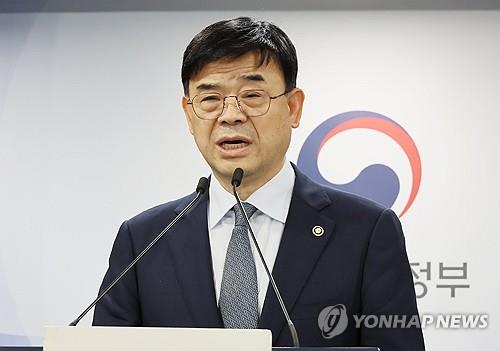(LEAD) Vice land minister offers to resign over controversial housing market comments
(ATTN: REWRITES lead; UPDATES throughout)
SEOUL, Oct. 24 (Yonhap) -- First Vice Land Minister Lee Sang-kyeong offered to resign Friday over his recent comments suggesting people should buy homes after the overheated housing market stabilizes, amid revelations of his past property dealing that apparently run contrary to the current administration's policy.
Lee had come under fire after appearing on a YouTube channel earlier this week, where he said, "When the market stabilizes and housing prices fall, that's when people can buy homes."
In a brief notice sent to the media late in the evening, the ministry said Lee has "offered to resign."
The vice minister's remarks triggered sweeping criticism from online communities, and both the ruling and opposition parties, accusing the vice minister of being tone-deaf to difficulties faced by ordinary people buying homes, as the government last week tightened housing-related loans in an effort to rein in soaring home prices.
It was later learned that Lee had purchased a home by leveraging a so-called "gap-investment" scheme using South Korea's unique jeonse system. Jeonse is a unique housing rental system in South Korea in which tenants make a large lump-sum deposit to landlords instead of paying monthly rent.
Many housing market watchers interpreted the government's mortgage-related loan restriction, along with the designation of all of Seoul and 12 areas in Gyeonggi Province as regulated speculative zones, as tools to eradicate such investment methods.
The real estate professor-turned-vice minister reportedly has close ties with President Lee Jae Myung and is known to have offered policy advice since the president's days of serving as Seongnam mayor and governor of Gyeonggi Province.
The housing market has emerged as a hot button topic in politics ahead of the local elections set to be held in June.
Apartment prices in Seoul have been on a steep increase in recent months, especially in neighborhoods around the Han River, fueling speculative demand and accelerating upward price trends, emerging as a key policy test for the new government.
The government has hinted at the possibility of raising the property holding tax to stabilize the housing market, but the ruling Democratic Party has distanced itself from such discussions, apparently due to concerns of possible fallout from supporters.
Discussions of raising the property holding tax have emerged despite the president having stressed during his campaign as a candidate that his administration would refrain from relying on tax hikes as a primary tool for housing market stabilization.
(END)
-
(LEAD) N. Korea breaks ground on memorial museum for its troops killed in Russia's war with Ukraine
-
Around 20 N. Korean soldiers briefly cross MDL, retreat after warning shots
-
2 N.K. soldiers briefly cross MDL to apparently chase defecting soldier: sources
-
(2nd LD) Trump, Xi to both pay state visits to S. Korea during APEC gathering
-
S. Korea, U.S. still far apart on key issues in trade talks, despite some progress
-
U.S. detention of Koreans hits trust in alliance, underscores long-festering visa issue
-
U.S. crackdown leaves 'deep scar' on economic ties, possible delays in investments: experts
-
Tough tasks ahead on trade, security as Lee set to mark 100 days in office
-
Ruling bloc appears cautious about pardon of ex-minister Cho Kuk
-
'So close, yet so far': S. Korea-Japan ties at pivotal moment 60 yrs after normalization

